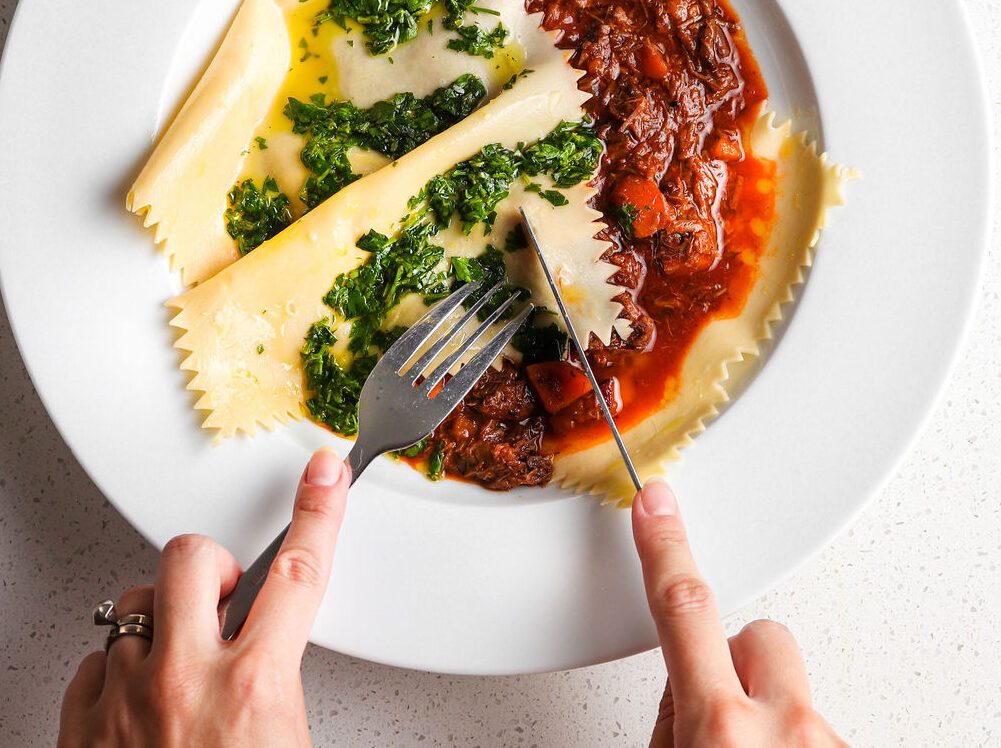
Handkerchief Pasta with Slow Cooked Beef Cheek Ragu
|
|
Time to read 3 min
|
|
Time to read 3 min
A slow-cooked ragu is the ultimate comfort for me, especially this one where beef cheeks are cooked in red wine and passata for hours. Do I want an actual hug or this meal? I think you know the answer. And yes, that might be the pandemic talking but this plate of pasta will take you to a place no real-life hug can, I’m sure of it.
The ragu is a deceptively simple sauce to prepare with a huge flavor payoff. Beef cheeks are an underutilized cut of meat, in my opinion, and yet, they are tender and luscious, especially when cooked slowly, like in this ragu. As a bonus, they’re a rather cost-effective cut, making it a great choice for a big batch of sauce to serve to a large group.
To go with the ragu, I have chosen a handkerchief pasta. There’s something striking about these large rustic sheets, which lazily embrace the sauce like a cozy blanket. What’s more, is that they are incredibly simple and quick to prepare.
For the finishing touch, I like to top the pasta with a zingy gremolata–my secret weapon for any meat sauce. It cuts through the richness of the meat, giving the dish balance and freshness. I suggest starting with the zest and juice of half a lemon, then adding more to taste.

90 minutes
4 hours
4-6
3 pounds beef cheeks
salt and pepper, q.b.
3 tablespoons olive oil
½ cup (100 grams) pork lardons (can substitute for thick-cut pancetta or bacon)
2 carrots, diced into 1-cm pieces
2 sticks celery, diced into 1-cm pieces
1 onion, diced into 1-cm pieces
3 sprigs rosemary, leaves picked
3 sprigs thyme, leaves picked
4 anchovies (optional)
4 cloves garlic, finely diced
½ liter Chianti, or any red wine you like
1 (680-gram) jar of tomato passata
½ liter beef stock
1 batch fresh egg pasta dough
1 packed cup flat-leaf parsley
1 lemon
salt and pepper, q.b.
pinch of chili flakes (optional)
¼ cup olive oil
About 4 tablespoons freshly grated parmesan
Preheat your oven to 350℉ (150℃).
Season the beef cheeks well with salt and pepper. Heat olive oil in a large stockpot or Dutch oven. Add the beef cheeks and sear over medium to high heat until browned all over. Remove and set aside.
Add a splash of more olive oil, if needed, and fry the pork lardons (or bacon) until golden. Add the carrots, celery, onion, herbs, and anchovies and fry gently for 10 to 15 minutes until slightly softened. Add the garlic and cook for another 2 minutes, until fragrant. Add the wine and let it reduce for another 3 minutes. Add the passata and stock and bring to a simmer.
Add the beef cheeks back to the pot. There should be enough liquid to almost cover them, it’s ok if they are bobbing out the top slightly. Top up with some stock to cover them if needed. Place a lid on top so there is the tiniest gap for steam to escape.
Cook in the oven for four hours, turning the beef every hour. After four hours, check the beef. It should pull apart with a fork easily. If not, continue cooking for another hour.
Once the beef is cooked, take it out of the sauce and shred with a fork. Then return the shredded beef to the sauce. Season to taste.
Divide your pasta dough into quarters. Roll the dough, a quarter at a time, out to about 1 mm-thick (setting 6-7 on a Marcato Atlas 150 Machine or setting 4-5 on a Kitchen Aid). Cut each sheet into 5 x 12 inch (12 x 31cm) rectangles with a fluted pasta wheel .
If not cooking straight away, store the handkerchief pasta in the fridge, layered between sheets of parchment paper. Pasta can be stored in the fridge for up to 24 hours.
Finely chop the parsley and place in a bowl. Add the zest and juice of half a lemon, the olive oil, a pinch of salt and pepper, and chili flakes and stir. Add more lemon zest and juice, to taste.
Cook pasta sheets in a pot of boiling, salted for 2 minutes. Drain the pasta then place the sheets flat onto plates. Top with ragu on one half then flip the sheet down, sandwiching the ragu in between. Top with gremolata and freshly grated parmesan.


